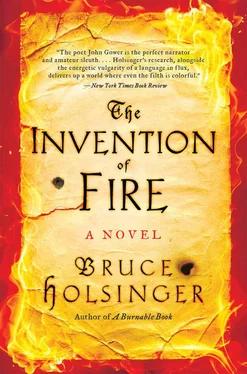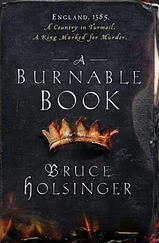Bruce Holsinger - The Invention of Fire
Здесь есть возможность читать онлайн «Bruce Holsinger - The Invention of Fire» — ознакомительный отрывок электронной книги совершенно бесплатно, а после прочтения отрывка купить полную версию. В некоторых случаях можно слушать аудио, скачать через торрент в формате fb2 и присутствует краткое содержание. Год выпуска: 2015, Издательство: HarperCollins, Жанр: Исторический детектив, на английском языке. Описание произведения, (предисловие) а так же отзывы посетителей доступны на портале библиотеки ЛибКат.
- Название:The Invention of Fire
- Автор:
- Издательство:HarperCollins
- Жанр:
- Год:2015
- ISBN:нет данных
- Рейтинг книги:3 / 5. Голосов: 1
-
Избранное:Добавить в избранное
- Отзывы:
-
Ваша оценка:
- 60
- 1
- 2
- 3
- 4
- 5
The Invention of Fire: краткое содержание, описание и аннотация
Предлагаем к чтению аннотацию, описание, краткое содержание или предисловие (зависит от того, что написал сам автор книги «The Invention of Fire»). Если вы не нашли необходимую информацию о книге — напишите в комментариях, мы постараемся отыскать её.
The Invention of Fire — читать онлайн ознакомительный отрывок
Ниже представлен текст книги, разбитый по страницам. Система сохранения места последней прочитанной страницы, позволяет с удобством читать онлайн бесплатно книгу «The Invention of Fire», без необходимости каждый раз заново искать на чём Вы остановились. Поставьте закладку, и сможете в любой момент перейти на страницу, на которой закончили чтение.
Интервал:
Закладка:
That was the question, though to her a less pressing one than the journey itself and the peril they still faced.
They came together again in the morning, and spent the first part of that day aglow on their saddles, horses drifting together, then apart, lost in the dangerous wonder of it, their rancor forgotten.
At the first crossing north of Aldwick two Yorkshire sheriffs waited upon the travelers. The sheriffs had dismounted, tied their horses to nearby trees, and now stood in the middle of the junction, their palms toward the company.
“Where do you hail from, good gentles?”
“We are of Essex, London, and Kent,” said their leader, “and are now bound for Durham and St. Cuthbert’s shrine.” He related the joining of the two groups, their progress along the road, the stop in Aldwick the night before.
“We are devoted pilgrims, good sire,” said Constance, jangling her coat, which was festooned with saintly trappings of every color, shape, and substance.
“Truly we are,” Catherine added as she touched a relic pinned to her girdle.
“Show your badges, if you please.” The sheriffs started mingling with the company, inspecting wares, asking soft questions, looking carefully at faces.
The pilgrims busied themselves with their various badges from journeys past, some leather or cloth patches sewn onto their garments, others medallions or brooches of pewter, lead, and even silver bought at sacred sites.
Margery had none, nor did Robert. Constance, she noted, was proudly showing four badges of Becket, all of hammered tin, each purchased for a penny or two in Canterbury in years past. Eventually a sheriff reached them.
“It is our first pilgrimage,” Margery said, trying to sound bashful.
“At my insistence, and our parson’s.” Robert put a hand on her arm.
“We are not seasoned travelers like the others.” She glanced aside at Constance, who was watching the exchange intently.
“Yet you chose Durham for your first voyage?” The sheriff’s eyes were on his face, not hers.
“It was thought-,” she began.
“Sir?” the sheriff cut her off, still focused on him. “A long journey for a first, and with such a young wife to saddle along the way.”
His companion laughed. The pilgrims had gone silent, watching the exchange.
“Why Durham, if you please?”
Robert stared down at the sheriff. Her heart sped. She willed him to answer.
“It was the dun cow,” he finally said, looking off at a distant hill.
“The dun cow, you say?” said the sheriff.
Titters from the pilgrims. He seemed to be losing all his sense.
“The dun cow,” he repeated. “It was always my favorite story of St. Cuthbert, that dun cow, and my parson’s as well. Upon a time, you see, a group of monks went looking for a final resting place for the body of the saint. The abbot had a vision, and in that vision the blessed Cuthbert demanded that his body be taken to a place called Dunholme. No one had ever heard of this Dunholme, nor knew where it might be, and the monks were in a kind of despair. Eventually the company came upon a milkmaid searching out a cow. And what sort of cow? A dun cow, she said. As they stood in the road another milkmaid came by, and the first asked the second if she’d seen a dun cow go by. ‘Why yes,’ said the second maid. ‘It went up that path just there, toward Dunholme.’ The monks took the body of St. Cuthbert along up that path, following the milkmaid all the way, and there, at the end of the path, they found the dun cow chewing at the grass in her favorite spot. Dunholme, now Durham, of course, and there Cuthbert’s shrine was built and his body laid, and soon enough the church and the town were built around it. And so as we pilgrims walk the road to Durham, we follow in the steps of that humble dun cow, as I have wished to follow its steps since I was a child. At the end of that path we shall graze in the lord’s mercy and grace, God willing-and sheriffs willing.”
It thrilled her to hear the laughter and admiring murmurs prompted by his story, from both the pilgrims and the sheriffs, whose small suspicions were quickly allayed. Soon their talk turned to the purpose of their vigilance.
“A French ship has been found shored up above Bridlington,” said one of them. “Out from Sluys, most like, and set to keep a mustard eye on our preparations in the northern shires.” He went on to describe some of the crown’s efforts against the French in the area, the merciless hunt for agents of their allies the Scots.
“You’ll see two cursed Scots dangling from the gibbet as you ride into York, you will,” said a sheriff with a satisfied nod. He looked around at them. “Any of you met or heard of such vagrants and spies, consorting with Scotsmen in these parts?”
Headshakes and sober denials all around. Soon the company was on its way with the sheriffs’ blessings.
They rode in silence for the rest of that day, as words could do little to convey what they felt within. He looked over at her several times, and when she met his gaze she smiled grimly at him, as they shared their newfound lust and the certain knowledge of their peril. They sensed a world closing in around them.
Chapter 31
Entering Desurennes that week was like visiting a desolate church during pestilence time. The people’s faces were either twisted in sorrow or emptied of all passion, yet against my expectation I sensed little anger at the renewed appearance of English soldiers in this broken village. There was rather a shared sense of resignation apparent in the town, as the residents endured the lingering effects of the massacre.
Le jour de canons, they had taken to calling it. The day of guns.
The village lay some nine leagues from Calais along a well-maintained road. Beauchamp had sent along eight strong riders, all of us leaving at dawn and arriving before dusk, taking lodging at an inn that also served as the central gathering place for the market village. In the morning the soldiers brought in the old man mentioned by Beauchamp to speak with me in the hall. He was perhaps ten years my elder, his parchment skin taut against protruding bones. He sat before me stiffly. Despite his age his back was board-straight against the table behind him.
We spoke in French. He told me how the strange men had first appeared. They came not from along the road but from within the forest, then calmly prepared their weapons, lit a fire on the gentle rise above the market, acting friendly and unconcerned with the townspeoples’ curiosity. Everyone saw the start of their approach with the guns, yet no one knew what the weapons were, and thus no one believed the market was in danger. Only two of the strangers were archers, he said, hiding their bows until the last moment. They stepped forward first.
“The guards went down, and that was when I knew,” he said. “I was standing at the edge of the market, where the horse line forms, when I saw the first arrows fly. Two capable archers were all they needed, and the guards of the gate were slain. Then they advanced on the market.”
He gave me a few more details: the number of troops, the formation. Each of the assailants had fired four guns already loaded, while a second man was required to light the powder, as I had experienced in the castle yard at Calais. It was relentless, he said, like a forest of limbs cracking all at once, bodies falling right and left, bits of blood and flesh flying through the market. His own son had fallen near the end of the assault, before the company turned for the woods and disappeared.
The old man’s face was a waxen slate empty of passion. I considered him, this bereaved father, and wanted him to tell me more. “You are a former soldier, are you not?”
Читать дальшеИнтервал:
Закладка:
Похожие книги на «The Invention of Fire»
Представляем Вашему вниманию похожие книги на «The Invention of Fire» списком для выбора. Мы отобрали схожую по названию и смыслу литературу в надежде предоставить читателям больше вариантов отыскать новые, интересные, ещё непрочитанные произведения.
Обсуждение, отзывы о книге «The Invention of Fire» и просто собственные мнения читателей. Оставьте ваши комментарии, напишите, что Вы думаете о произведении, его смысле или главных героях. Укажите что конкретно понравилось, а что нет, и почему Вы так считаете.












